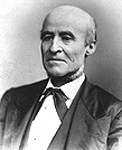![[Previous]](https://webarchive.library.unt.edu/eot2008/20090115154100im_/http://www.loc.gov/images/prev.gif)
![[Next]](https://webarchive.library.unt.edu/eot2008/20090115154100im_/http://www.loc.gov/images/next.gif)
Hispanic Americans in Congress, 1822-1995
JOSÉ MANUEL GALLEGOS

[Courtesy Museum of New Mexico #9982]
Delegate
Democrat of the Territory of New Mexico
Thirty-third - Thirty-fourth Congresses
March 4, 1853 - March 3, 1857
Forty-second Congress
March 4, 1871 - March 3, 1873
Father Gallegos was an influential, popular, and controversial figure in the history of New Mexico. Powerful in his parish and elsewhere, he was the first New Mexican Delegate to Congress. José Manuel Gallegos was born on October 30, 1815, in the town of Abiquiu, Nuevo México, which is now in Rio Arriba County, New Mexico. He began his education at a parochial school, and studied theology in Durango, Mexico, where he was ordained a Roman Catholic priest in 1840. Upon his return to New Mexico, Gallegos began his political career.
From 1843 to 1846 Gallegos served on the Legislative Assembly of the Department of Nuevo México. When the Treaty of Guadalupe Hidalgo ended the Mexican-American War (1847-1848), New Mexico became a territory of the United States. Gallegos was elected to the first Territorial council of New Mexico in 1851.
This same year authority over Catholic Church matters was transferred from the Bishop in Durango to the French Bishop Jean Baptiste Lamy. A power struggle ensued because Gallegos and the native clergy were reluctant to accept the new authority, and continued their allegiance to the Bishop of Durango. Lamy suspended Gallegos from his parish in Albuquerque because of an unauthorized trip Gallegos made to Durango.
Beginning in the summer of 1853, Gallegos dedicated himself completely to his political career. In part due to the support and guidance of David Merriwether, a Democrat who would later become Governor of New Mexico, Gallegos changed his allegiance to the United States. Merriwether instructed Gallegos on the principles of the Democratic Party. Gallegos did not speak English fluently, so he had Merriwether write down everything, and later had it translated into Spanish. Gallegos also had the support of the Penitentes, a New Mexican lay religious brotherhood. Gallegos was able to win the Democratic nomination for U.S. Delegate, despite the opposition from New Mexican politicians who called themselves the "American Party" and nominated James Carr Lane.
Gallegos won the election, and in March 1853, he left for Washington to begin his service as Delegate to Congress. The election was contested by James Carr Lane. Even though the House Committee on Elections found no grounds for supporting the charge, this action nonetheless set a precedent of contesting New Mexican elections, which lasted well into the twentieth century. During Gallegos' first term as Delegate, Congress did not take much interest in the territories except for the Indian question, which involved the property rights of citizens of states versus the rights of the Native Americans. Congress did, however, pass a number of appropriations which included funds for the territory of New Mexico such as public buildings, territorial government expenses, and the authorization for the employment of a translator.
Gallegos won the election to a second term, but he was denied his seat because of a powerful speech that his political opponent Miguel A. Otero delivered on the floor of the House contesting Gallegos' election. Otero appealed to the House on the basis of his loyalty to the United States despite his being a "native citizen" of what recently had been a part of Mexico. He said he was the first to come to the Congress of his "adopted fatherland" who could address the House "in the language of its laws and its constitution." The House seated Otero even though Gallegos, the incumbent, had a purported slim majority of the votes in the election, which Otero claimed were from Mexican citizens who had voted illegally.
Despite this setback, Gallegos returned to New Mexico and continued with his political career. In 1860 he was elected to the Territorial House of Representatives as the representative from Santa Fe; he served as Speaker of the House from 1860 to 1862. In 1862 he was defeated in his reelection bid. That same year the Texas Confederate troops took him prisoner. At the outbreak of the Civil War, Gallegos became a fervent Union supporter and provided information and assistance to Union forces when Confederates took over Santa Fe.
Gallegos served as treasurer of the territory from 1865 to 1866 and superintendent of Indian affairs for New Mexico in 1868. He returned to the U.S. House of Representatives as a Delegate from New Mexico in the 42nd Congress, but was unsuccessful in his bid for reelection in 1872. He died in Santa Fe, New Mexico on April 21, 1875.
For further reading:
Chavez, Fray Angelico. But Time and Chance: The Story of Padre Martínez of Taos. Santa Fe: Sunstone Press, 1981.
Chavez, Fray Angelico. Tres Macho-He Said: Padre Gallegos of Albuquerque, New Mexico's First Congressman. Santa Fe: William Gannon, 1985.
Vigil, Maurilio. Los Patrones: Profiles of Hispanic Political Leaders in New Mexico History. Washington, D.C.: University Press of America, 1980.
Go to:
 Library of Congress
Library of Congress
Comments: Ask a Librarian (06/10/97)

![[Previous]](https://webarchive.library.unt.edu/eot2008/20090115154100im_/http://www.loc.gov/images/prev.gif)
![[Next]](https://webarchive.library.unt.edu/eot2008/20090115154100im_/http://www.loc.gov/images/next.gif)
 Library of Congress
Library of Congress